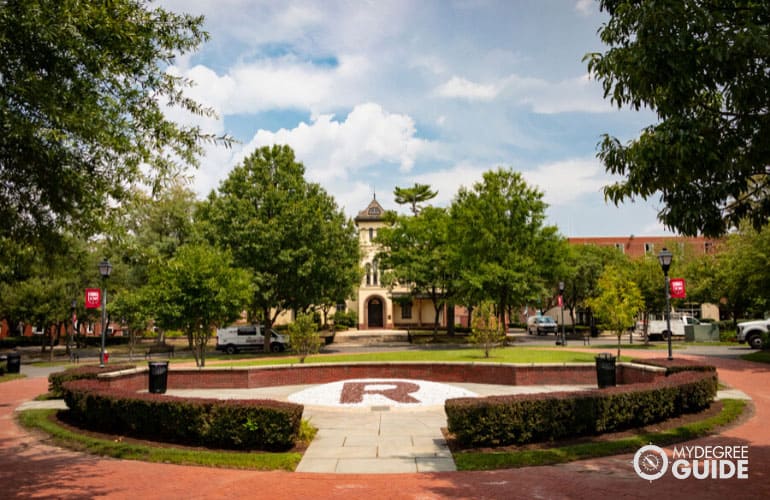Searching for the fastest online degree programs?
Whether you want to earn your associate’s degree or the fastest online bachelor degree possible, accelerated online classes can help you meet your goals.

What is the fastest you could earn your bachelor degree? Would you believe 3 years? Or less? Yes, I said or less. You could get an online bachelor’s degree in less than three years. That is unbelievably fast. But doable.
Editorial Listing ShortCode:
List of Universities Offering the Fastest Online Degree Programs
Rankings Methodology
We chose these schools because of their accreditation, accelerated classes, variety of degrees, and online learning opportunities.
1. Albertus Magnus College
- BS in Business Management
- BS in Computer Information Systems
- BS in Criminal Justice
- BS in Finance
- BS in Health Care Management
Albertus Magnus College is accredited by the New England Commission of Higher Education.
2. American Intercontinental University
American Intercontinental University, otherwise known as AIU, is an open-admissions university founded in 1970. The university has three campuses: one in Georgia, one in Texas, and a third one based online.
The online campus has become increasingly popular in recent years and is now considered the university’s main campus. Students can study a range of bachelor’s and master’s degrees there.
- Bachelor of Accounting
- BBA in Accounting
- BBA in Finance
- BBA in Healthcare Management
- BBA in Management
AIU is regionally accredited by the Higher Learning Commission.
3. Azusa Pacific University
Azusa Pacific University is an evangelical Christian university that is based in Azusa, California. The university was founded in 1899, and it opened its doors to students one year later in 1900.
The university has a fast-growing online program that offers a wide range of different courses for students. The university is organized into three colleges and spread across seven different campuses.
- BA in Psychology
- Bachelor of Business Administration
Azusa Pacific is accredited by the WASC Senior College and University Commission.
4. Brenau University
Brenau University is a university in Georgia that is spread across several campuses in the state. The main campus for the university is in Gainesville, while other campuses are in Atlanta, Norcross, and Fairburn, with one being out of state in Jacksonville, Florida.
Brenau University puts a lot of focus on smaller class sizes and also offers students an online classroom where they can obtain their degrees.
- Bachelor of Science in Nursing
Brenau University is accredited by the Southern Association of Colleges and Schools Commission on Colleges.
5. Brescia University
Brescia University is a Catholic university that is based in Owensboro, Kentucky. The university was founded in 1925 as a women’s junior college, but it is now a full university where students can obtain both bachelor’s and master’s degrees.
Brescia University teams are known as the Bearcats, and they compete in the River States Conference.
- BA in Theology
Brescia is accredited by the Southern Association of Colleges and Schools Commission on Colleges.
6. California Baptist University
- BA in Business Administration
- BA in Christian Ministries
- BA in Communication
- BA in Early Childhood Studies
- BA in English
- BA in Graphic Design and Digital Media
- BA in Human Services
- BA in Liberal Studies
- BA in Organizational Leadership
- BA in Psychology
- BA in Public Administration
- BA in Sociology
- BA in Sport, Recreation and Fitness Management
- BS in Criminal Justice
- BS in Cybersecurity
- BS in Healthcare Administration and Management
- BS in Kinesiology
- BS in Marketing
- BS in Network Administration and Management
- BS in Public Health
California Baptist University is regionally accredited by the Western Association of Schools and Colleges Senior College and University Commission.
7. California University of Pennsylvania
The California University of Pennsylvania is a university that can be found in the city of California, in Pennsylvania. The university is a member of the Pennsylvania State System of Higher Education.
It has an enrollment of 7,500 students, and its campus consists of around 38 different schools. The California University of Pennsylvania also has a very quickly growing online school that offers students both bachelor’s and master’s degrees.
- BA in Arabic
- BSBA – Integrated Global Business
- RN to BSN
Cal U is a public university accredited by the Middle States Commission on Higher Education.
8. Capella University
- BS in Business – Accounting
- BS in Business – Business Administration
- BS in Business – Human Resource Management
- BS in Business – Management and Leadership
- BS in Health Care Administration
- BS in Health Care Management
- BS in Information Technology
- BS in Information Technology – Information Assurance and Cybersecurity
- BS in Information Technology – IT Project Management
- BS in Psychology
- RN to BSN
Capella University is accredited by the Higher Learning Commission.
9. Central Washington University
Central Washington University, also known as CWU, is a public university located in Ellensburg, Washington. The university was established in 1891 and has an enrollment of around 12,000 students, 11,000 of which are undergraduates.
The Central Washington Wildcats are the university’s sports teams, and they play 12 different sports for both male and female students.
- Bachelor of Science in Nursing
CWU is currently an accredited institution through the Northwest Commission on Colleges and Universities.
10. Colorado Technical University
Colorado is a university that was formed in 1965. The university gained university status in 1995, having been a college aimed at ex-military personnel for the previous 30 years.
The university has two campuses, one in Colorado Springs and one in Denver, but the majority of the university’s students are online. It is still an incredibly popular university for veterans and has received several awards in recent years for its efforts.
- BS in Accounting
- BS in Computer Science
- BSBA
- BSBA in Business Development
- BSBA in Data Analytics
- BSBA in Digital Marketing
- BSBA in Finance
- BSBA in Healthcare Management
CTU is regionally accredited by the Higher Learning Commission.
11. Concordia University – Chicago
- Bachelor’s in Kinesiology
Concordia University Chicago is accredited by the Higher Learning Commission.
12. Eastern Kentucky University
- Bachelor’s of Business Administration – Public Accounting
- Bachelor’s of Business Administration – Risk Management & Insurance
- Bachelor’s of Communication Studies
- Bachelor’s of Corrections & Juvenile Justice Studies
- Bachelor’s of Emergency Medical Care – Emergency Services Administration
- Bachelor’s of Emergency Medical Care – Fire Service
- Bachelor’s of Fire, Arson and Explosion Investigation
- Bachelor’s of Fire Protection and Safety Engineering
- Bachelor’s of General Studies
- Bachelor’s of Paralegal Science
- Bachelor’s of Police Studies
- Bachelor’s of Psychology
- Bachelor’s of Social Work
- Bachelor’s of Sport Management
- RN to BSN
Eastern Kentucky University is accredited by the Commission of Colleges of the Southern Association of Colleges and Schools Commission on Colleges.
13. Excelsior College
Excelsior College is a private college located in Albany, New York. The college was founded in 1971 and is one of the biggest suppliers of online adult education in the state of New York.
The college is made up of three schools: one for undergraduates, one for postgraduates, and one for nursing. It currently has around 30,000 students enrolled in courses, the majority of which are adult learners using the distance education platform.
- BS in Business – Finance
- BS in Business – General Accounting
- BS in Business – General Business
- BS in Business – Logistics Management
- BS in Business – Management of Human Resources
- BS in Business – Marketing
Excelsior is accredited by the Middle States Commission on Higher Education.
14. Granite State College
Granite State College is a public educational institution located in Concord, New Hampshire. The university offers mostly online courses, and the majority of the students who are enrolled are part-time adult learners. The university offers both bachelor’s and master’s degrees online.
The university is a part of the University System of New Hampshire and has seven campuses located around the state in Claremont, Conway, Lebanon, Nashua, Portsmouth, Rochester, and Manchester.
- BS in Business Management
- BS in Criminal Justice
- BS in Psychology
Granite State is accredited by the New England Commission of Higher Education.
15. Gwynedd Mercy University
Gwynedd Mercy University is a university located in Lower Gwynedd Township, Pennsylvania. The university has Catholic affiliations, and its main campus is located in the Archdiocese of Philadelphia.
Gwynedd has a fairly small enrollment of around 2,000 students, though it does also have a strong online school that offers both full and part-time degree programs in a range of subjects.
Gwynedd Mercy has 19 different sports teams and is a member of the National Collegiate Athletic Association and Colonial States Athletic Conference. They compete at the NCAA Division III level.
- BS in Business Administration – Health Administration
- BS in Business Administration – Organizational Management
GMercyU is accredited by the Middle States Commission on Higher Education.
16. Huntington University
Huntington University is located in Huntington, Indiana. It’s a private Christian university that is a part of the Church of the United Brethren in Christ and is also a member of the Council for Christian Colleges and Universities.
The university campus is home to around 1,500 students. The university also has a wide range of online programs that are designed to give adult learners a flexible learning experience.
- BS in Marketing
- BS in Not-for-Profit Leadership
- BS in Psychology
- BS in Science in Human Resource Management
- BS in Social Work
- BSBA
Huntington is accredited by the Higher Learning Commission.
17. Indiana Institute Of Technology
The Indiana Institute of Technology, also known as Indiana Tech, is a private university in Fort Wayne, Indiana.
The university is organized into five separate colleges. It also has a specially focused online program that offers both master’s and bachelor’s degrees. It also offers accelerated degree programs through this platform.
Indiana Tech has 11 sports teams for both its male and female students, and they compete in the National Association of Intercollegiate Athletics.
- BA in Communication
- BA in Information Systems
- BS in Accounting
- BS in Child Development
- BS in Criminal Justice
- BS in Criminal Justice – Administration
- BS in Criminal Justice – Crime Analysis
- BS in Criminal Justice – Rehabilitative Services
- BS in Cybersecurity
- BS in Emergency Response Management
- BS in Health Information Management
- BS in Human Services
- BS in Industrial Manufacturing Engineering
- BS in Organizational Leadership
- BS in Psychology
- BSBA – Business Communication
- BSBA – Entrepreneurial Studies
- BSBA – Financial Services
- BSBA – Health Care Admin
- BSBA – Human Resources
- BSBA – Management
- BSBA – Management Info. Systems
- BSBA – Marketing
- BSBA – Sports Management
Indiana Tech is accredited by the Higher Learning Commission.
18. Indiana Wesleyan University
- BS in Addictions Counseling
- BS in Business Information Systems
- BS in Communication
- BS in Criminal Justice
- BS in Human Services
- BS in Integrative Studies
- BS in Management
- BS in Marketing
- RN to BSN
Indiana Wesleyan University is accredited by The Higher Learning Commission.
19. Liberty University
- Bachelor’s in Respiratory Therapy
- BEd in Elementary Education
- BEd in Middle Education
- BEd in Special Education
- BS in Aviation
- BS in Aviation Maintenance Management
- BS in Biblical and Educational Studies
- BS in Business Administration
- BS in Christian Leadership and Management
- BS in Civil Engineering
- BS in Commercial Music
- BS in Computer Science Cybersecurity
- BS in Criminal Justice
- BS in Early Childhood Education
- BS in Elementary Education
- BS in English and Writing – Creative Writing
- BS in English and Writing – Journalism
- BS in Fire Administration
- BS in Government
- BS in Healthcare Administration
- BS in History
- BS in Informatics – Healthcare Informatics
- BS in Information Systems
- BS in Information Technology
- BS in Interdisciplinary Studies
- BS in Law and Policy
- BS in Military Studies – History
- BS in Military Studies – International Security
- BS in Military Studies – Professional
- BS in Military Studies – Resiliency
- BS in Nursing (RN to BSN)
- BS in Nursing (RN to BSN) – Global Studies
- BS in Paralegal Studies
- BS in Political Science
- BS in Political Science
- BS in Psychology
- BS in Public Administration
- BS in Religion
- BS in Special Education Interdisciplinary Studies
- BS in Strategic Communication – Social Media Management
- BS in Teaching English as a Second Language
- BS in Worship Studies
Liberty University is accredited by the Southern Association of Colleges and Schools Commission on Colleges.
20. Loyola University – Chicago
Loyola University is a private university located in Chicago, Illinois. The university was founded by the Jesuits in 1870 and is now one of the biggest Catholic universities in the entire country. The university has around 16,000 students and has 11 different colleges spread out across the city of Chicago.
Loyola University Chicago is home to 11 different sports teams, collectively known as the Loyola Ramblers. They have been largely successful over the years, winning championships football, volleyball, and basketball.
- BA in Information Technology
- BA in Management
LUC is accredited by the Higher Learning Commission (HLC) and was first accredited in 1921.
21. Lynn University
Lynn University is a private university that is based in Boca Raton, Florida. It is an independent university that was founded in 1957 and now has a student enrollment of around 3,000.
Lynn University also has an excellent non-profit online university that is specifically designed for students who are a little bit older or who have life obligations. Their focus is on making this education as easy and as affordable as possible for working adults.
- BA in Communication and Media
- BA in Criminal Justice
- BA in Liberal Arts
- BS in Aviation Management
- BS in Business Administration
- BS in Early Childhood Education
- BS in Elementary Education Grades K-6
- BS in Entrepreneurship
- BS in International Business Management
- BS in Psychology
Lynn is accredited by the Southern Association of Colleges and Schools.
22. National University
National University is a network of nonprofit educational institutions headquartered in San Diego, California. It is dedicated to providing flexible, quality education for busy adults.
NU offers a wide variety of degree programs that can be completed online or at one of its on-campus locations in California.
- BA in Psychology
- Bachelor of Business Administration
National University is regionally accredited by the Western Association of Schools and Colleges.
23. Regent University
Regent University is a Christian university in Virginia Beach, Virginia. Regent also has another campus in Alexandria, Virginia. The university was founded in 1977 and has around 8,600 students enrolled for courses, with around 3,000 of them being undergraduates.
The university also offers an ever-growing selection of online courses for students who may not have the time or desire to take part in a traditional program.
- BA in Biblical & Theological Studies
- BA in Christian Ministry
- BA in Communication Studies – Advertising-Public Relations
- BA in Communication Studies – Internet & Social Media
- BA in Communication Studies – Journalism
- BA in Communication Studies – Organizational Communication
- BA in Communication Studies – Professional & Technical Writing
- BA in Communication Studies – Rhetoric & Public Culture
- BA in Communication Studies – Strategic Communication
- BA in Communication Studies – Theatre
- BA in Communication Studies – Undeclared
- BA in English
- BA in English – Biblical Studies
- BA in English – Government
- BA in English – History (European)
- BA in English – History (U.S. History)
- BA in English – History (World)
- BA in Government
- BA in Law & National Security
- BA in Leadership Studies
- BA in Leadership Studies – Christian Ministry
- BA in Leadership Studies – Criminal Justice
- BA in Leadership Studies – Information Technology
- BS in Accounting
- BS in Business Analytics
- BS in Christian Leadership & Management
- BS in Computer Engineering
- BS in Computer Science
- BS in Criminal Justice
- BS in Cyber & Digital Forensics
- BS in Cybersecurity
- BS in Early Childhood Education
- BS in Gerontology
- BS in Healthcare Management
- BS in Healthcare Management – Nursing Home Administration
- BS in Human Resource Management
- BS in Information Systems Technology – General
- BS in Information Systems Technology – Information Security
- BS in Management
- BS in Management Information Systems
- BS in Marketing
- BS in Paralegal Studies
- BS in Professional Studies – Biblical & Theological Studies
- BS in Professional Studies – Business
- BS in Professional Studies – Christian Ministry
- BS in Professional Studies – Communication Studies
- BS in Professional Studies – Criminal Justice
- BS in Professional Studies – Government
- BS in Professional Studies – Healthcare Management
- BS in Professional Studies – History
- BS in Professional Studies – Information Systems Technology
- BS in Professional Studies – Leadership Studies
- BS in Professional Studies – Marketing
- BS in Professional Studies – Psychology
- BS in Professional Studies – Teacher Education
- BS in Psychology
- BS in Psychology – Clinical & Counseling Psychology
- RN to B.S. in Nursing
In 1984, Regent University received accreditation from the Southern Association of Colleges and Schools.
24. Saint Leo University
Saint Leo University is a Roman Catholic university located in St. Leo, Florida. The university is associated with the Holy Name Monastery and Saint Leo Abbey. It is named after Pope Leo the Great.
The university is one of the five largest Roman Catholic universities in the country. It has over 40 campuses and also offers an excellent online university for its students. In fact, around 7,000 of its 11,000 enrolled students are online.
Saint Leo’s sports teams are known as the Lions, and they compete in various different sports as members of the National Collegiate Athletic Association’s Division II.
- BA in Accounting
- BA in Business Administration – Logistics
- BA in Business Administration – Management
- BA in Business Administration – Project Management
- BA in Criminal Justice
- BA in Criminal Justice – Criminalistics
- BA in Criminal Justice – Homeland Security
- BA in Educational Studies – Early Childhood Development
- BA in Elementary Education
- BA in Human Resource Management
- BA in Human Services
- BA in Liberal Studies
- BA in Psychology – Clinical/Counseling
- BA in Psychology – General
- BA in Religion
- BA in Sociology
- BA in Sociology – Applied & Clinical
- BA in Sociology – Diversity & Inequality
- Bachelor of Software Engineering
- BS in Computer Information Systems
- BS in Computer Science – Information Assurance
- BS in Cyber Security
- BS in Health Care Administration
Saint Leo is accredited by the Southern Association of Colleges and Schools.
25. Troy University
Troy University is a public university located in Troy, Alabama and is the main university in the Alabama University State System.
The university was founded in 1887 and has a student enrollment of around 18,000 when you include its online students. The university offers a wide range of online courses, both full-time and part-time.
The university’s sports teams are known as the Troy Trojans, and they are one of the most successful in the state. The men’s football, basketball, and baseball teams have all found a lot of success. Notably, they also offer a rodeo program to students.
- BAS in Resource And Technology Management
- BS in Anthropology
- BS in Applied Computer Science
- BS in Criminal Justice
- BS in English
- BS in Geographic Information Sciences
- BS in History – American/Latin American
- BS in History – European/Asian/African
- BS in Hospitality, Sport and Tourism Management – Hospitality Management
- BS in Hospitality, Sport and Tourism Management – Sport Management
- BS in Hospitality, Sport and Tourism Management – Tourism Management
- BS in Human Services
- BS in Interdisciplinary Studies
- BS in Interpreter Training Program
- BS in Occupational Education
- BS in Political Science – American Politics And Public Administration
- BS in Political Science – International Politics
- BS in Psychology
- BS in Social Science
- BS in Social Work
- BS in Sociology
- BSBA in Global Business – Accounting and Finance
- BSBA in Global Business – General Business
- BSBA in Global Business – Human Resource Management
- BSBA in Global Business – Management
- BSBA in Global Business – Marketing
Troy is accredited by the Southern Association of Colleges and Schools.
26. University of Maryland – Global Campus
The University of Maryland – University College is a public university based in Adelphi, Maryland. The university’s primary focus is on online education and is one of the largest online educational institutes in the world. It has around 90,000 students enrolled in over 120 different online courses.
The university also offers a traditional classroom experience and offers a wide range of both undergraduate and postgraduate degree programs. They also offer several face-to-face courses in Bahrain, Djibouti, Egypt, Kuwait, Qatar, and the United Arab Emirates.
- BA in Communication Studies
- BA in English
- BA in Graphic Communication
- BA in History
- Bachelors in Social Science
- Bachelors in Software Development and Security
- BTPS in Laboratory Management
- BS in Accounting
- BS in Business Administration
- BS in Computer Networks and Cybersecurity
- BS in Computer Science
- BS in Criminal Justice
- BS in Cybersecurity Management and Policy
- BS in Digital Media and Web Technology
- BS in Homeland Security
- BS in Information Systems Management
- BS in Investigative Forensics
- BS in Laboratory Management
- BS in Legal Studies
- BS in Nursing
- BS in Political Science
- BS in Psychology
- BS in Public Safety Administration
UMGC is accredited by the Middle States Commission on Higher Education.
27. Upper Iowa University
Upper Iowa University is a private university in Fayette, Iowa. The university specializes in distance learning and has around 15 centers in the US, including an online program. In total, there are around 6,000 students studying through Upper Iowa University.
The Upper Iowa University’s sports teams are known as the Upper Iowa Peacocks, and they are currently the only team in the state to be a part of the NCAA Division II Athletics Program.
- BA in Graphic Design
- BA in Liberal Arts
- BA in Sociology
- BS in Accounting
- BS in Business Administration – Entrepreneurship
- BS in Business Administration – Finance
- BS in Business Administration – General
- BS in Business Administration – Global
- BS in Business Administration – Health Services Administration
- BS in Business Administration – Human Resources Management
- BS in Business Administration – Marketing
- BS in Communication – Communication Studies
- BS in Communication – Mass Media
- BS in Communication – Sports Communication
- BS in Criminal Justice
- BS in Emergency and Disaster Management
- BS in Financial Management
- BS in Health Services Administration
- BS in Human Resources Management
- BS in Human Services
- BS in Information Systems
- BS in Information Technology
- BS in Management
- BS in Marketing
- BS in Psychology
- BS in Public Administration – Emergency Management
- BS in Public Administration – Fire Science
- BS in Public Administration – General
- BS in Public Administration – Law Enforcement
- BS in Public Administration – Policy/Politics
- BS in Social Science
- BS in Software Engineering
- RN to BSN Nursing
UIU is accredited by the Higher Learning Commission.
28. Washington State University
Washington State University is a public research university based in Pullman, Washington. Founded in 1890, the university has the second-largest by student enrollment in the entire state of Washington, with around 30,000 students being educated there.
Around 3,000 of these students are educated through the university’s impressive and ever-growing online program.
Washington State has a very impressive athletics program in the Cougars. The Cougars currently compete in the NCAA Division I in the Pac-12 Conference. There is a total of six men’s teams and nine women’s teams who compete for the school.
- BABA – Accounting
- BABA – Management
- BABA – Management Information Systems
- BABA – Marketing
- Bachelor of Arts in Anthropology
- Bachelor of Arts in Criminal Justice and Criminology
- Bachelor of Arts in English
- Bachelor of Arts in History
- Bachelor of Arts in Hospitality Business Management
- Bachelor of Arts in Human Development
- Bachelor of Arts in Humanities
- Bachelor of Arts in Political Science
- Bachelor of Arts in Social Sciences
- Bachelor of Arts in Sociology
- Bachelor of Arts in Strategic Communication
- Bachelor of Science in Biology
- Bachelor of Science in Data Analytics
- Bachelor of Science in Earth and Environmental Sciences
- Bachelor of Science in Economic Sciences
- Bachelor of Science in Psychology
WSU is regionally accredited by the Northwest Commission on Colleges and Universities.
29. Western Governors University
This Salt Lake City, Utah university was founded as recently as 1997. It uses a competency-based model in which students complete as many classes as they can in a set time period and then turn in their work when they’re ready to be graded.
WGU offers very flexible education paths for both undergraduates as well as master’s students.
- BS in Cloud and Systems Administration
- BS in Computer Science
- BS in Cybersecurity and Information Assurance
- RN to BSN
Western Governors University is accredited by the Northwest Commission on Colleges and Universities.
30. Wilmington University
Wilmington University is a private, doctoral university located in New Castle, Delaware.
The university was founded in 1967 and earned itself university status in 2007, making it one of the newest universities in the state. Wilmington has six other campuses in Delaware and some other locations in the state of New Jersey.
It is home to around 20,000 students, 12,000 of which are undergraduates. It also offers an excellent online program for distance learners.
The university’s sports teams are known as the Wildcats, and they compete in the NCAA Division II and the Central Atlantic Collegiate Conference. They have seven teams for men and nine for women.
- BS in Accounting
- BS in Applied Technology
- BS in Behavioral Science
- BS in Business Management
- BS in Communication
- BS in Computer and Network Security
- BS in Computer Science
- BS in Criminal Justice
- BS in Environmental Science and Policy
- BS in Finance
- BS in Government and Public Policy
- BS in Health Sciences
- BS in Information Systems Management
- BS in Liberal Studies
- BS in Marketing
- BS in Organizational Dynamics
- BS in Organizational Management
- BS in Psychology
- BS in Sports Management
- RN to BSN
Wilmington is accredited by the Middle States Commission on Higher Education.
Online Degree Programs
Fast online degree programs are ones that are fully accelerated. Or, at the very least, offer accelerated classes. If you can’t find a fully accelerated program to pursue your bachelor’s degree, there are still a variety of ways to earn your degree fast.
- Accounting
- Business Administration
- Communications
- Computer Science
- Criminal Justice
- Education
- Emergency Management
- English
- Finance
- Fire Science
- Forensics & Crime Scene Investigation
- Game Design
- General Studies
- Health Sciences
- Healthcare Administration
- History
- Human Services
- Information Technology
- Legal Studies
- Liberal Arts
- Management
- Marketing
- Psychology
- Public Administration
- Public Health
The benefits of earning a bachelor’s degree are many. More exciting job opportunities! A more stable job! More money! Best of all, a sense of accomplishment.
Earning a bachelor’s degree fast can mean that while your peers are still slogging through school, you are already enjoying the benefits of better job opportunities and a higher pay scale.
Accounting

Accountants are responsible for keeping track of important financial data for individuals or businesses. Programs in this field address topics like statistics, finance, auditing, economics, business law, and financial records. Specializations for accounting degrees include Cost Accounting, Taxation, Management Accounting, Auditing, and Forensic Accounting.
Students in an accounting program can apply the credit hours that they earn toward the educational requirements for the Certified Public Accountant (CPA) exam; working as a CPA also requires state licensure.
Editorial Listing ShortCode:
Potential careers for accounting professionals include public accountant, auditor, tax preparer, financial analyst, controller, or chief financial officer.
Business Administration

Many people who work in the business world studied business administration in school. The curriculum in this department covers accounting, marketing, and management. Other topics include data analysis, finance, economics, ethics, leadership, and human resources.
Some degree programs are tailored to specific industries, such as healthcare, hospitality, insurance, or manufacturing. Other students elect to choose a degree specialization that they can apply in a variety of workplaces; concentration examples include Operations Management and Accounting.
Editorial Listing ShortCode:
Graduates work in sales, banking, financial analysis, project management, and other business roles. Some professionals take exams to become Certified Managers or Certified Management Accountants.
Communications

Are you interested in media, journalism, writing, or web design? If so, a degree in communications might be a good educational path for you.
There are a lot of opportunities for creativity in a communications course of study, and you may take classes about mass communications, video, photography, reporting, and digital media.
Students must be aware of the laws and ethics that should guide communication decisions.
Editorial Listing ShortCode:
Graduates can apply their degrees to many different fields as public relations specialists, marketers, or social media managers. Others go into communications-specific fields, such as journalism, publishing, or editing.
Computer Science

STEM skills are in demand, and you can gain them in an online computer science degree program. Your studies will address databases, cloud computing, operating systems, and software development. You’ll learn about statistics, big data, and data analytics.
Studying programming languages and web design will give you practical skills that can increase your employability. A degree in computer science may help you launch your own business or join the team of a tech-savvy startup.
Editorial Listing ShortCode:
You could also work in the IT department of a business as a programmer, a database manager, a systems analyst, or a software developer.
Criminal Justice

If you have a strong sense of right versus wrong and want to see justice prevail, then consider a course of study in criminal justice. This degree is useful for people who want to work in law enforcement or the court system.
Subjects studied in criminal justice include investigations, juvenile offenders, legal processes, police activity, and corrections systems. Some criminal justice programs are paired with criminology studies, in which you’ll learn about criminal behavior.
Editorial Listing ShortCode:
Many graduates work in police departments, courtrooms, or corrections facilities. An undergraduate criminal justice degree can also prepare students for law school.
Education

As a teacher, your career can be dedicated to inspiring classrooms full of learners. Whether you want to teach kids or adults, a college program focused on education will equip you with essential skills. You’ll learn about classroom management and teaching styles.
You may take classes like Curriculum and Instruction, Classroom Technology, Differentiated Instruction, and Diversity in Educational Settings. Your program may prepare you for working among certain groups of students, such as preschoolers, college adults, special-needs students, or English-language learners.
Editorial Listing ShortCode:
In addition to classroom teaching, you may also pursue an education degree to become a school administrator or a curriculum writer.
Emergency Management

From storms to explosions, disasters can strike at any time. Emergency management students learn skills and processes that are essential in those moments. These college programs include classes on reducing the likelihood of disasters and being prepared for when emergencies do arise.
You’ll also learn how to respond quickly to crises so that you can save as many people and infrastructure systems as possible. You and your fellow students will then discuss ways to lessen the long-term impact of major disasters.
Editorial Listing ShortCode:
This degree may prepare you to work in municipal government, homeland security, consulting firms, or nonprofit organizations.
English

For a course of study that’s devoted to language expression, turn to an English degree. In particular, you’ll study the ways that written and spoken words have shaped culture and society, and you’ll practice crafting your own influential words.
Many of your classes will cover literature from great writers, especially those of British and American heritage. You’ll also take writing classes to learn more about journalism, business writing, creative writing, and other forms of composition.
Editorial Listing ShortCode:
Graduates find employment in a variety of fields, including teaching, publishing, writing, law, and healthcare.
Finance

How should money matters affect future business decisions? In a finance program, you’ll make connections between a company’s financial standing and its best strategies for future growth. Finance programs cover topics like assets, investments, risk management, and valuation.
This program often requires strong math and reasoning skills, and you should expect to take classes in statistics and economics. Many programs cover financial operations both at home and abroad.
Editorial Listing ShortCode:
A finance degree can help you find a job in commercial or investment banking. You could also work in the finance department of a large company or go into the insurance field.
Fire Science

The more education that firefighters have, the more tools they have to draw on when responding to a blaze. A fire science program covers the scientific principles behind combustion and the spread of a fire.
As a fire science student, you’ll discuss prevention and suppression, and your classes may include Firefighter Safety and Water Supply Strategies. You may also learn about arson and explore methods of fire investigation.
Editorial Listing ShortCode:
Graduates may be prepared to assume leadership roles in municipal fire departments. You could also consider a career in fire investigation, safety inspection, or forest-fire prevention.
Forensics & Crime Scene Investigation

Law enforcement teams rely on the careful work of crime scene investigators and forensic scientists. Earning a degree in forensics and crime scene investigation will give you the skills to identify clues and draw meaning from them.
If your studies focus primarily on crime scene investigation, you’ll learn to collect, store, and record evidence. To become a specialist in forensic science, you’ll learn lab skills and take classes in chemistry and other scientific disciplines.
Editorial Listing ShortCode:
All crime scene investigators and forensic scientists must become familiar with the law and justice systems, and they may be called on to testify in court at times.
Game Design

If you’re a video game aficionado, you might be interested in pursuing a career in game design. Of course, to make impressive games, you have to know how to do more than simply operate a controller. That’s why you could choose to pursue a degree in game design.
You’ll learn about the technical aspects that go into creating a video game, from programming to graphic design. The courses will also teach you to consider what game characteristics appeal to people as they play, and you’ll practice developing compelling storylines.
Editorial Listing ShortCode:
This degree can prepare you to be a concept artist, an animator, or a programmer.
General Studies

Are you having trouble finding a college program that meets your exact educational goals? You might do well to pursue a degree in general studies.
With a general studies major, you may be able to design your own course of study that aligns with your future goals. Alternatively, a general studies program may give you a broad, well-rounded education that touches on many of the major disciplines.
Editorial Listing ShortCode:
You might take classes in science, literature, math, writing, culture, economics, and history. General studies can be a good college program for adult students who are going back to school.
Health Sciences

Becoming a doctor or a nurse isn’t the only way to get into the medical field. A degree in health sciences will let you enter the medical field in other capacities.
For example, this program can prepare you to work as a health services manager, a paramedic, or a medical technician. With further training, you could become an occupational therapist, a physician assistant, or a physical therapist.
Editorial Listing ShortCode:
To earn a health sciences degree, you’ll study healthcare delivery systems, nutrition, the human body, diagnostic tools, and information technology. You’ll also discuss healthcare law and ethics.
Healthcare Administration

People in healthcare administration may be responsible for much of the behind-the-scenes work in a medical facility, or they may hold some of the top leadership positions.
In your college program, you are likely to study epidemiology, public health, finance, medical diagnoses, and human resources. Marketing, ethics, and team leadership may be covered as well. Concentration options might include Health Policy and Operations.
Editorial Listing ShortCode:
With this degree, you could work for a hospital, an insurance company, or a pharmacy. Potential job positions include medical transcriptionist, health services manager, underwriter, program administrator, or chief executive officer.
History

During your studies for a history degree, you’ll have countless opportunities to dig into the past. As you study events and cultures from earlier times, you may analyze artwork, artifacts, and primary-source documents.
Some programs may have a specific outline of history courses that you need to take, while others allow you to select classes that fit into your scope of interest. In addition to acquiring basic history facts, you’ll learn to think critically about how race, gender, and culture have influenced the course of events.
Editorial Listing ShortCode:
History majors may become educators, curators, librarians, writers, diplomats, or archivists.
Human Services

All around you, there are people in need of a helping hand. With a human services degree, you can spend your career providing that assistance.
Your course of study will include classes on sociology, psychology, human development, and social services. You may earn how to evaluate the needs of a community and create programs or initiatives to address those concerns. Your program may offer concentrations like Youth Services, Addictions, Family Relationships, or Administration.
Editorial Listing ShortCode:
Many people in this field pursue jobs as social workers. You can also use your human services degree as a program manager or a career counselor.
Information Technology

Think about how much information you have stored on your personal computer. It’s probably a lot, but businesses have exponentially more data in their files. As an information technology professional, you can head up tech-based systems for keeping track of an organization’s data.
In school, you’ll learn about databases, networks, and interfaces. Other topics will include software design and cybersecurity. Plus, the faculty will help you learn how to lead IT projects and analyze systems. Some programs feature concentrations like Networks and Software Programming.
Editorial Listing ShortCode:
Career options include network manager, information security specialist, programmer, and IT director.
Legal Studies

For a career in law and justice, start with a college program in legal studies. Whether you’d rather spend time in law offices or courtrooms, you’ll acquire the knowledge you need in classes like Legal Research, Legal Ethics, Jurisprudence, and Paralegal Practices.
You’ll learn about various law disciplines, including civil, criminal, family, real estate, business, tort, and contracts.
Becoming a paralegal is a common career path for legal studies students, and others choose to enroll in law school.
Editorial Listing ShortCode:
You might also become a legal assistant, a magistrate judge, or a court assistant.
Liberal Arts

For a college experience that allows you to dive deep into a study of the humanities, enroll in a liberal arts program.
While you take classes in language, literature, art, history, and sociology, you’ll gain valuable skills that you can employ in any workplace. These may include critical thinking, creative brainstorming, and clear communication.
Because liberal arts degrees are versatile and give you a well-rounded education, they might boost your employability for jobs in museums, publishing companies, nonprofit organizations, advertising agencies, and other settings.
Editorial Listing ShortCode:
Potential job titles include manager, editor, and researcher.
Management

If you want to supervise others in business settings, consider a degree in management. This course of study will also prepare you to oversee programs or processes.
Your classes might include Business Law, Accounting, Macroeconomics, Microeconomics, and Business Communications. You may also take Marketing, International Management, and Ethics for Managers. Some schools offer concentrations like Leadership, Operations, Sports Management, Construction Management, and Public Relations.
Editorial Listing ShortCode:
This degree program is useful for people who want to go into sales or marketing. The principles learned in business management can also help you succeed as an analyst, a banker, or an underwriter.
Marketing

When you think about marketing, advertising might be the first thing that comes to mind. That’s an important part of marketing, but it’s not all that this field encompasses. Marketing is also about brand recognition, packaging design, and product placement.
Students in marketing programs must learn how to identify customers’ needs and desires, and then promote products or services that fulfill them. Classes may include Marketing Research and Consumer Insights. Schools may offer specializations like Sales or Social Media.
Editorial Listing ShortCode:
A marketing degree can be useful in public relations, advertising, sales, product design, and customer service.
Psychology

Whether you want to counsel clients or work in a business setting, a psychology degree can be a useful part of your career training.
Psychology students all learn about human thought and behavior, but then, they often go on to do very different things. Some apply their knowledge to sales, public relations, or management positions. Others work in schools or medical facilities. Some pursue the required education and licensure to become clinical psychologists.
Editorial Listing ShortCode:
Classes in a psychology program may include Social Psychology, Marriage and Family Relationships, Psychopharmacology, and Personality Theory.
Public Administration

Public agencies and nonprofit organizations can benefit from the leadership and management skills that you will learn in a public administration program.
You’ll study topics like budgeting, grant writing, team dynamics, public policy, and project management. The specialization choices might include Local Government, Nonprofit Leadership, and Financial Management.
With this degree, you could hold a job title like program manager, budget analyst, or administrator.
Editorial Listing ShortCode:
Your employer could be a municipal government, a community program, a human services agency, or a nonprofit organization. You might also find many of your skills applicable to the business world.
Public Health

Specialists in public health strive to improve wellness on a community-wide scale. They might reduce barriers to medical care, run educational programs, administer vaccine clinics, or campaign for health policies.
If you choose to study public health, you’ll take classes like Epidemiology, Healthcare Ethics, Health Equity, Leadership and Team Management, and Environmental Health. Public health is a broad field, so you may want to narrow your focus with a specialization like Nutrition, Health Policy, or Health Education.
Editorial Listing ShortCode:
With this degree, you could become an epidemiology researcher, a community educator, or a health services manager.
Fastest Online Degrees and Classes

No matter how you look at it, the fastest online degree programs are accelerated programs.
These programs are specifically designed to bring you from start to finish through a bachelor’s degree in less time than if you had chosen a traditional bachelor’s degree program.
For example, the average time it takes students to complete a bachelor’s degree is 4-5 years, but you can easily complete your degree in an accelerated program in 3 years or less.
Accelerated programs are intended for adult learners and working adults. Schools with accelerated online programs understand how to structure classes and degree requirements to suit an adult learner with responsibilities other than simply going to school full-time.
If a fully accelerated program isn’t going to work for you, you might want to still look at accelerated classes. This is really the next best alternative for earning a quick degree. Make sure that your program not only offers these classes but that it also offers these classes within your major.
If a program only offers accelerated classes in the core curriculum, and you’ve already received credit for those core classes, then you won’t be able to take advantage of the accelerated classes. Taking accelerated classes within your major (which is usually the majority of the credits you are required to complete) is a great way to quicken the pace of your degree.
Fastest Associate’s Degree

An associate’s degree is typically a two-year program (60 credit hours), but you can complete a degree in some fields much more quickly.
Popular Associate’s Degrees:
- Business Administration
- Computer Information Systems
- Criminal Justice
- Health Information Technology
- Health Sciences
- Information Technology
- Paralegal Studies
- Psychology
Here’s a list of Accelerated Associates Degrees Online.
Fastest Bachelor’s Degree

The quickest bachelors degree online programs can be in almost any field you can imagine.
The most popular bachelor degrees that people currently pursue online are in the fields of:
- Accounting
- Business
- Communications
- Criminal Justice
- Education
- Graphic Design
- History
- Information Technology or Computer Science
- Management
- Psychology
- Religion
You can find programs that offer accelerated degrees in any of these fields.
Degrees that require more hands-on training won’t be offered fully online, but you may be able to find hybrid programs that offer these degrees.
What will make the fastest online degree programs fast is not a specific degree but rather what the degree program offers in terms of acceleration. In other words, you probably won’t finish a bachelor’s degree in Accounting any faster than you’ll finish a bachelor’s degree in Education, even if both are offered through the same institution and are accelerated online programs.
Since most bachelor degree programs require around 120 hours for degree completion, choose an accelerated online program in the field you love and want to establish a long-lasting career in.
When you put in that much work to get a bachelor’s degree, you’ll want to make sure you’ll actually like the job you get.
Fastest Master’s Degree

When you prepare for starting a Master’s degree, you are usually looking at 2 years of study (60 credit hours). But again, some degrees are better suited to going fast.
The fastest online Master’s degrees are in:
- Accounting
- Business Administration
- Criminal Justice
- Education
- Engineering
- Finance
- Healthcare Administration
- Learning Technology
- Psychology
- Special Education
These degrees work for going fast because the courses are easy to find in online classes, there is no thesis involved, and they are not overly specialized. As an example, you could be done with your master’s degree in Healthcare Administration in 15 months through South New Hampshire University.
What Makes a Degree Fast?
Most bachelor degrees require around the same amount of total credit hours (120), so they all take about the same time to complete. What will slow you down is usually your own personal life situation, your relationship with an institution and its faculty, and how focused you are on working on your degree.
How Can You Tell which Programs are the Fastest Bachelor Degrees?
Besides these primary factors of determining how long a bachelor’s degree program will take to complete, there are other factors to consider as well.
Credit Hours
One of these other factors is the number of credit hours required to complete a degree. Most bachelor degree programs require around 120 hours for graduation. There are some programs, such as a Bachelor of Science in Engineering or a Bachelor of Arts in Music, that require upward of 136 credit hours. If you’re looking to quicken the pace of your degree, avoid these programs.
Thesis/Internship
Another factor to consider when choosing a program is whether or not you are required to complete a senior capstone or thesis project or an internship component. These requirements usually only give you 3-6 credit hours of credit but can take a lot of time to organize and implement.
Choose a program that only requires coursework to graduate. Don’t make this harder for yourself. If the field you really want to enter has a requirement like this (Education, for example) and it’s vital to future job prospects, plan ahead for it.
Check out our article, How to Finish College Faster, for more info.
Top 10 Fastest Bachelor’s Degrees

Earning a bachelor’s degree can mean more exciting and stable job opportunities, increased pay, and an overall sense of accomplishment.
The degree you choose doesn’t dictate how long it will take you to complete the degree. The degrees on this list are the fastest online bachelor’s degrees because they have the potential for fast entry into the workforce once you’re done.
Some degrees will require additional hours and even graduate work before you can comfortably begin a rewarding and high-paying career in that field rather than becoming an assistant or lower-paid staff member.
If you’re looking for the fastest online bachelor degrees out there, this list will give you a solid sense of which degrees are:
- The quickest and will get you out into the workforce ASAP
- Going to prepare you for that professional career you’ve been craving
Getting started is often the hardest step. These top 10 fastest online degree programs will give you an idea of what you can look forward to.
1. Business Administration

Once you have a degree in Business Administration at the bachelor level, you can get to work immediately.
Why you should choose a degree in Business Administration:
Hands down, Business Administration is the most popular online degree. There is no licensure or graduate school work required to join the workforce with a high-paying salary.
With a degree in Business Administration, countless career opportunities are available to recent grads. If you’re social and excel at managing others, consider a career in management. Managers are needed at small companies, non-profit organizations, and government entities.
According to the Bureau of Labor Statistics (BLS), managers earn an average of over $109,760 per year. While it may take you a few years of experience to get to that level of salary, you can confidently apply for a lower-level management position right out of school and work your way up.
If keeping to yourself is more your style, a degree in Business Administration can prepare you for an analyst job. Many companies hire people who understand the business world to research and analyze data so that they can improve their products and services.
BLS reports that market research analysts (people who analyze the economic market) make about $65,810 per year.
| Career Options | Annual Median Salary |
| Manager | $109,760 |
| Analyst | $65,810 |
This sector is expected to grow 32% over the next decade, which is at a much faster rate than average.
2. Communications

Possessing communication skills along with a degree can get you hired in a variety of positions. You could work for a politician writing speeches, produce promotional material, or even join the quickly growing field of internet marketing.
Why you should choose a degree in Communications:
If you pursue a degree in Communications, you will have the skills to understand the dynamics of relationships within a company and community. You will be integral in forging lasting relationships and can even help with conflict resolution.
Communications degree holders can find jobs within the fields of education, human resources, government administration, journalism, public relations, advertising, higher education, and business. There is no single career track for a student who studies Communications, which makes it an exciting degree choice.
The money isn’t shabby either.
3. Criminal Justice

Intelligence analysts are probably the highest paid professionals with this degree. They make over $86,940 per year (BLS) on average and work for exciting entities like the FBI. This career path usually involves working in an office and requires advanced analysis and critical thinking skills.
Why you should choose a degree in Criminal Justice:
If you want to become a police officer, security officer, or intelligence analyst, consider a degree in Criminal Justice. Most of these professions only require a bachelor’s degree and are exciting career paths for the bold and daring. A degree in Criminal Justice can also prepare you for law school or similar graduate opportunities.
If action suits you, and you’ve always wanted to become a police officer, a degree in Criminal Justice could help you move from a small, local police force to a higher profile police station or even a career with the FBI. Police officers and detectives make about $67,290 per year, but there’s room for promotion and salary increase with experience.
| Career Options | Annual Median Salary |
| Intelligence Analyst | $86,940 |
| Police Officer | $67,290 |
Criminal Justice is a wide field with many possible specialties, so ensure that the school you’re considering offers a curriculum package suited to your interests.
4. Education

Without a bachelor’s degree in Education, you’ll most likely only find assistant jobs that pay a fraction of what you could be making as a lead teacher. If you want to go into early childhood education, special education, or teach in a public school, a bachelor’s degree in Education will prove highly valuable to you.
Choose a program that enables you to become licensed by the end; some of these may be 5-year programs and take a bit longer than the average 4-year degree.
Why you should choose a degree in Education:
Many people feel called to teach, and a degree in Education can help make your dreams a reality.
Teachers are steadily in demand across the nation. Elementary school teachers are more in demand than high school teachers, though they make less per year. Elementary school teachers can expect to make about $60,940 per year, while high school teachers can expect to make about $62,870 per year (BLS).
| Career Options | Annual Median Salary |
| Elementary Teacher | $60,940 |
| High School Teacher | $62,870 |
Of course, education is a field in which the region and city heavily influence the pay rate. Working in an affluent county or large city usually means a higher salary than working in a rural area.
5. Finance

A degree in finance will set you apart from other business degree holders. A finance degree, while similar to a business degree, adds an extra bit of pizzazz to your resume, highlighting your skills in money management.
Why you should choose a degree in Finance:
A degree in finance offers you a myriad of job opportunities. The financial job market is continuing to see growth even during times of economic downturn.
Financial analysts work for companies or individuals and counsel them about the best investments to make with their money. BLS found that the average financial analyst makes just shy of $83,660 per year. And only a bachelor’s degree is required for some of these high-paying positions in the field.
6. Healthcare Administration

As long as there are people, there will be a need for healthcare. This gives you a pretty good indicator of job security.
Why you should choose a degree in Healthcare Administration:
Managing a healthcare facility such as a hospital or nursing home requires in-depth knowledge of the medical field. A degree in Healthcare Administration will prepare you to work on the logistics of a medical facility behind the scenes.
BLS reports that medical managers make over $104,280 per year and that the field is growing much faster than average. There is room within this field for promotion, mobility, and career satisfaction.
7. Information Technology

A degree in Information Technology is one of the fastest online bachelor degrees because of the ability for you to go on quickly to satisfying career positions.
Jobs in the Information Technology field are numerous. Make a list of all the businesses that you know that use computers. That’s about how many jobs there are in IT. The types of jobs range from consultants who work with people and companies on teams to web and software developers who work more on their own.
Why you should choose a degree in Information Technology:
Computer knowledge and skills are worth a lot in today’s world.
IT consultants are hired to analyze the efficiency of a company’s information systems and suggest alternative methods or means of improvement. BLS indicates that IT consultants make about $93,730 per year and that the field is growing faster than average. IT consultants for the top companies in the country can make much more per year.
Computer network or cloud architecture is one of the highest paying niches in the field right now. Cloud architects organize and manage cloud networks for companies so that their data is safe, secure, and easily accessible. Cloud architects make $116,780 per year depending on knowledge and skills.
| Career Options | Annual Median Salary |
| IT Consultant | $93,730 |
| Network Architect | $116,780 |
Like most niches within the information sector, cloud architecture and management is also growing faster than average.
8. Nursing

While it’s not the fastest online bachelor’s degree if you have no prior school or work experience in the field, it’s a very quick degree if you’re already a registered nurse (RN).
RN to Bachelor of Science in Nursing (BSN) programs are extremely popular among RNs because they enable you to expand your career and pay opportunities by earning your degree. These online programs are designed for working nurses and can usually be completed in less than two years.
Why you should choose a degree in Nursing:
Nurses are in high demand, and the field is growing faster than average. RNs make about $75,330 per year (BLS), but career and salary opportunities can increase with a BSN degree.
9. Psychology

With a degree in Psychology, you can apply for entry-level positions in many different areas, including marketing, sales, advertising, rehabilitation, psychiatric services, real estate, social work, childcare, healthcare, parole, and career counseling.
Why you should choose a degree in Psychology:
A degree in Psychology is similar to Communications in terms of career opportunities. Of course, those wishing to become psychologists or licensed counselors can continue on to the graduate level.
There are plenty of career opportunities if you have a bachelor’s degree in Psychology. You could become a career counselor, a case manager, a rehabilitation counselor and advocate, or a probation/parole officer, among other career opportunities.
Because most of these careers involve working with a vulnerable population, they usually don’t pay as well as some other career options with degrees on the Top 10 list. These jobs are, however, highly rewarding and satisfying for most people within them. For example, a career counselor makes about $58,120 per year, which is above par with the national average (BLS).
10. Religion

This is a broad field that includes serving in religious or educational institutions, healthcare facilities, and non-profit organizations. Whether you are faithful to one set of beliefs or are interested in learning how religion has shaped history and influences society, this is certainly an interesting and rewarding path to pursue.
Why you should choose a degree in Religion:
A degree in religion is a good fit if you feel called to help others in a variety of capacities. Most people who desire to pursue careers in religious education, clergy, or missionary work hold only a bachelor’s degree.
A member of the clergy makes about $51,940 per year (BLS) but is usually integral to the well-being and livelihood of a community. Often times, a clergy member receives other benefits, such as room and board. Someone with a degree in Religion is also prepared to work for a non-profit organization in a variety of capacities, and the salary opportunities there are often higher.
Accelerated Classes and Programs

The fastest online bachelor degree programs have a few things in common. First, they make use of accelerated courses and programs. Some degree programs are labeled and advertised as accelerated programs. This means that the acceleration has already been figured out for you. All you have to do is enroll in the program, and you will earn your degree at a faster pace than average.
Second, most accelerated programs cater to adult learners, many of whom hold part- or full-time jobs.
If you can’t find a suitable program that offers a fully accelerated degree, another option is to find a program that at least offers accelerated courses. Accelerated courses meet for less time than a traditional semester. That means you can take more courses each calendar year than you could in a program that didn’t offer them. Typical classes run for a 16-week term, but accelerated classes run for around 8 weeks.
You can almost double the number of classes you complete in a year.
You’ll have less time to master the material, but shaving off a year from your degree completion time can not only save you time but a lot of money.
Making the Most of Your Past Education and Experience

The primary way in which the fastest online bachelor degree programs offer acceleration to students is by accepting transfer credits. This can happen in a variety of ways, including accepting credits earned at a past institution, granting credit hours for sufficient scores on national exams, or for offering credit hours for life and work experience.
Most accredited and respected institutions will require that you complete at least half of your credit hours through their degree programs, but if you start out at a program having earned a majority of your core course requirements, you will earn your degree much faster than in a more traditional program.
Transfer Credits

If you have completed course credit at another institution, even if it was only one class, you can probably apply that credit toward your degree. Each program has its own requirements for what credit they accept and from which institutions. A lot of the limitations come from state laws.
If you can’t figure out if your credit would be accepted through the program’s website, contact someone at the registrar’s office. Never plan out your degree completion schedule until you know for sure that all the hard work you put in before you enter the program will be recognized and converted into credit.
It’s important to note that no program will automatically give you transfer credits. To receive these credits, you have to do a lot of work. This means completing any paperwork required through your program, petitioning for credit for work or other life experiences, and submitting the necessary documents on time.
Credit by Exam

If you complete the CLEP or DSST exams, you might be able to earn more than 30 credit hours toward your degree. Some programs offer computer proficiency and foreign language proficiency exams. The NYU foreign language proficiency exam can earn you up to 12 credits. You can apply to be tested in listening, reading, and writing skills in 50 different languages.
At Thomas University, students can apply to take a Computer Proficiency Exam for 3 credit hours. You would pay $350 and take the proctored exam. The exam tests you on your skills using Microsoft Excel, Powerpoint, Word, the Windows operating system, and the internet.
Credit for Life Experience

If you have any military experience or civil service training, you may be able to receive credit hours. Likewise, if you have worked in a job and have become an expert in a subject area or field, many online programs will give you credit for that expertise.
This is known as Credit for Prior Life Experiences. To achieve credit this way, some programs require you to compile an electronic or print portfolio that presents the work you’ve done in the past as well as an explanation or justification for why that work is worthy of college credit.
Accreditation

Be sure that you double-check the accreditation of your program. Although most colleges offering accelerated courses are accredited, it’s best to check! If you don’t, you could end up investing in a worthless degree.
There are six regional bodies that review universities and verify that the quality of the curriculum they offer. As long as your chosen institution is accredited by one of these boards, any work you complete there should transfer to other colleges, and any employer should respect your education.
Financial Aid

Of course, one thing that can slow you down is funding, so do all that you can to secure free money or delayed loans before you start. The best place to start is with the U.S. government’s Free Application for Federal Student Aid (FAFSA). With this, you can talk to your school about your possibilities.
You can also look into state funding, private organization grants, or tuition reimbursement from your employer. You’ll still likely need to make a significant investment into your education, but getting help from every avenue possible avenue can help put you on the fast-track to completing your degree.
What is the Easiest Degree to Get Online?
The easiest bachelor’s you can earn is the one in which your educational or life experiences will provide college credit right off the bat. Think about what you’ve done in life that would apply to a college degree. What kind of jobs have you held?
Next, you want to think about what your knowledge base is and which tests you can take to earn course credit.
Then, refer to our list of the fastest degrees to see which types of programs are easily accessible online.
Can You Get a Bachelor’s in Two Years?

Some people may be able to, but this is pushing it.
You’d probably need to have significant transfer credits from prior college attendance. For an institution to maintain its accreditation, it needs to ensure that it’s giving you a high-quality education, and this means that it generally wants the majority of the work to be done under its tutelage. Three years is a good goal to aim for.
Is There a Way to Earn 6-Month Bachelor Degrees?
If you find a school or online site offering the possibility of earning a bachelor’s degree in six months, run away. There’s no way that school can give you a high-quality education in so short a time. That means they’re not properly accredited. That means employers and other universities won’t accept the degree as being valid.
2 years is probably the fastest you want to go with your undergraduate education. With accelerated classes, this is doable. Invest the time to make it worth it.
Where to Go from Here?

We’ve presented a lot of information in this post, so let’s summarize the action plan:
- Decide which degree to pursue.
- Research which schools offer accelerated programs for your field of study and that accept transfer, test, and experience credits.
- Apply to the schools you’re interested in
- Secure financial aid
After that, work your tail off and earn that degree as quickly as possible!

